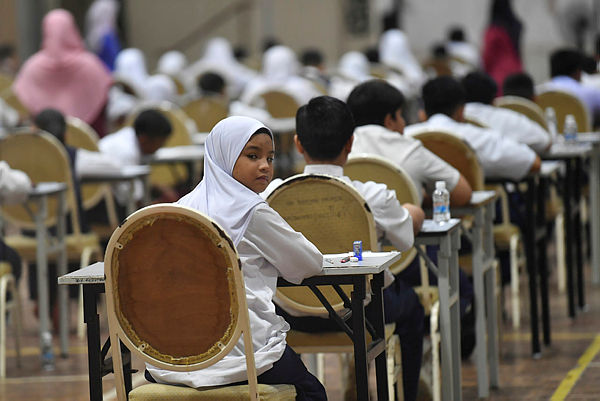SIBU: It will be an uphill task for Sarawak when it starts teaching Mathematics and Science in English at primary schools next year.
Many of the teachers have been using Bahasa Malaysia for donkey years to teach the subjects and they would have some problems implementing the change.
“Definitely many of them are not confident, shy and even scared to make mistakes because some of our students are very conversant in English especially those who come from the middle and upper class families,” said Sarawak Minister of Education, Science and Technological Research Datuk Seri Michael Manyin.
However, he urged the teachers not to worry too much about making mistakes and try their very best to do their work in the English language that they know, that is the Sarawak English.
“Don’t bother about grammar, don’t bother about the Queen’s English, speak the Sarawak English. Because that is where we have to start. ‘Gasak Ajak’ (Just Do it). So we start with this until finally someone points to us the mistake and gradually we will speak the pure Queen’s English,” he said and received a round of applause from over 600 teachers attending Sarawak English Language Education Symposium (Seles) 2019 here today.
By using English as a medium of instruction for the subjects for primary one pupils in 1,265 primary schools throughout the state, except for the Chinese schools (SJKCs), Sarawak will become the first state to do so and up to now more than 2,800 teachers have been trained for the purpose.
Manyin said the state government would give assistance and monitor the progress for the first three to six months.
He said the method of teaching would be different from those used in the 1960s to 1990s where nowadays they were required to facilitate the learning process of the school children.
“Teach less so that the children can learn more,” he said but reminded the teachers to be more prepared because the pupils will be more inquisitive.
The idea was to stimulate the pupils’ imagination of which from there it would develop into creativity and subsequently innovation, an example taken from Singapore’s education policy, said Manyin.
This would help to make the children of Sarawak more competitive in the future where people would be paid not based on what qualification that they had but on how much they could make use of their knowledge to contribute in their work.
Meanwhile, Chief Minister Datuk Patinggi Abang Johari Tun Openg, who was represented by his deputy Datuk Amar Douglas Uggah Embas in officiating the symposium said, the most important thing in education was to inculcate the need to learn and to be curious and creative.
“It is our goal to nurture and propagate a creative and innovative culture in Sarawak, especially among school children, in line with the Talent Development Strategy of the state’s Digital Economy Blueprint,” he said.
Sarawak which is currently on the Second Industrial Revolution (Industry 2.0), inevitably has no choice but to jump straight into the rising Industry 4.0 to avoid from being left behind and become irrelevant.
“And the direction that we have set for Sarawak, we have to prepare our children, our future workforce, and future leaders for Industry 4.0 as it could have a major impact on foreign direct investment (FDI) into Sarawak.
“Industry 4.0 revolutionises the landscapes of the workforce in the state. It may require fewer workers to carry out the works: manufacturing automation will utilise robots, and thus, human will become redundant and eventually be replaced,” he said.
Abang Johari lauded Seles 2019 as a good platform for sharing and discussing the latest innovations, trends, concerns as well as challenges encountered in the field of English Language education where through it, teachers will be able to get new insights, practices and experiences in teaching and learning process of English language. — Bernama













